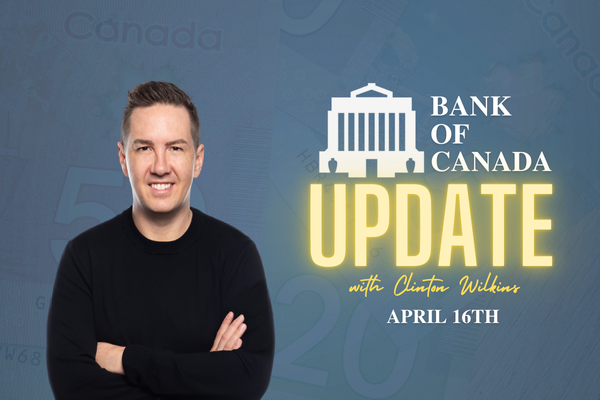On 95.7 News Radio, Clinton and Todd discussed the Yukon's government's new first-time home buyer program, offering low-interest loans to cover up to half of down payments while highlighting similar programs in Nova Scotia and New Brunswick.
Bank of Canada – Rates increase to 0.5 per cent: Should I take a variable or fixed rate? | March 2, 2022 as heard on CityNews 95.7
Clinton chats with CityNews 95.7 host, Todd Veinotte about the Bank of Canada announcement. The bank has increased the key overnight rate to 0.5 per cent. Clinton and Todd discuss how this will change consumers’ loans, and if people should stay the course in their variable-rate, or convert to a fixed-rate.
Bank of Canada – Rates increase 0.5 per cent: Should I take a variable or fixed rate?
Don’t feel like watching the video? Check out the transcript below.
Transcript:
Bank of Canada increased rate to 0.5 per cent
Todd Veinotte: [00:00:00.21] Joining us now is our mortgage guru, Clinton Wilkins, and we’re going to talk about the fact that the Bank of Canada has hiked its key interest rate to 0.5 per cent. Clinton Wilkins, we saw this coming now. We thought it might have been last month, but it’s arrived right?
Clinton Wilkins: [00:00:15.69] It has arrived, Todd. You know, there are some obviously positive outcomes of the rates being increased that Canadians are going to feel and, you know, there’s going to be some negative impacts.
We’ve been talking about rate increases for years. We’ve not seen the Bank of Canada increase the key overnight rate for four years. So I think some people thought it was never going up. Obviously, we don’t live under a rock.
We’ve been saying it’s been going up and it’s been a lot of like, wait and see. But the economy really has been chugging along quite well in Canada. And as we know, inflation right now is quite high. So the overnight rate is certainly a lever that the Bank of Canada can pull with its effort to reduce the inflation.
I’m in a variable-rate loan, now what?
Todd Veinotte: [00:01:02.13] What does this mean for people with variable-rates and not just mortgages, but loans? A lot of people have variable loans. What’s this mean for them? Obviously more money. It’s going to cost them more money, right?
Clinton Wilkins: [00:01:12.63] It’s going to cost them more money. So what’s going to happen is if you’re in a variable-rate mortgage that has an adjustable payment, a majority of mortgages that are variable in Canada have an adjustable payment. That means that your payment is going to go up.
How much will my mortgage payments increase?
Before the show, Todd, I did a little bit of a calculation: In our office our average mortgage amount is approximately $300,000 and I played with a 25 year amortization and a 25 basis point increase in a consumer’s rate, and it increased their mortgage payment by $35 a month. So, you know, if you’re in a biweekly payment, you may see $17 a month change in your mortgage payment.
So I think that’s something to think about. We certainly send out an email to all of our clients, just letting them know that obviously the change happened and many lenders will send out a payment change notification to borrowers that, you know, their payment is changing.
On an average $300,000 mortgage, most payments will increase around $35 a month
Todd Veinotte: [00:02:07.59] So what’s this mean? To put it in real numbers, I guess, if you will, for somebody with a I don’t know, can you tell like what type of increase? And obviously, it depends on somebody’s mortgage, but what kind of average increase would people be looking at here with this?
Clinton Wilkins: [00:02:22.23] You know, I think $300,000 is kind of the average mortgage, Todd, so I think we’re talking about $35 a month, if you have an adjustable payment.
Should I convert to a fixed-rate?
Todd Veinotte: [00:02:29.50] Yeah, so it’s not devastating. However, where might it end up, do you think?
Clinton Wilkins: [00:02:36.76] I don’t know. I don’t have a crystal ball on where it will end up, and a lot of consumers are asking me if they’re in a variable, should they convert into a fixed. We’ve been talking about this for a long time. In our opinion, you should stay the course.
To lock it into a fixed-rate today, you would take a fixed-rate in excess of three per cent, which in most cases would be double what the current variable-rate would be for the consumer. So our feedback is stay the course.
Historically, consumers do better in a variable-rate product, Todd, and yes, you need to be able to weather the storm. If you’re losing sleep at night over a 25 basis point increase and a $35 a month, you know, increasing your mortgage payment.
Todd Veinotte: [00:03:19.51] You’re in trouble.
Clinton Wilkins: [00:03:20.32] You have bigger problems. You honestly have bigger problems.
Todd Veinotte: [00:03:23.56] I don’t mean to laugh, but you’re right.
Our advice: Stay in your variable-rate
Clinton Wilkins: [00:03:26.35] Everything’s going up. I bought three packs of chicken breasts at the grocery store the other day, and I had a receipt from the previous week, and the chicken breast per pack were up like $4. So yes, I understand that $35 a month for some households is significant, but in the grand scheme, I think it’s maybe a little bit of the least of our worries.
You know, for Russia, for example, their overnight rate went up 20 per cent last night. So we had a very small increase. And yes, it will impact the end consumer.
But the one positive thing that’s going to happen and this is what the Bank of Canada is hoping for: Normally, when they increase the overnight rate, Canadians start saving money because on their saving vehicles you know, if that’s like a savings account, whatever, they’re going to be getting a higher rate of return now. And typically, when the cost of borrowing goes up, consumers are spending less.
The reason inflation is high is obviously because of some supply chain issues, but we’ve been at home for the last two years, Todd. People actually weren’t spending money. And now since we’re going out and about, we’re spending more, we’re buying more consumer goods and that is what’s increasing the inflation.
So the Bank of Canada and some economists are actually projecting that the target rate for inflation, they’re going to be at target by the end of the year. So I do not think the sky is falling. Do I think there’s going to be more increases? Yes, I do.
But I think if you’re in a variable-rate, it will still be cheaper than if you were to convert into a fixed. So our feedback overall, if you’re in a variable, stay the course.
Todd Veinotte: [00:05:08.05] Thanks, Clinton. Always appreciate your advice. Talk soon.
Clinton Wilkins: [00:05:11.62] Thanks, Todd. Have a great day.
Todd Veinotte: [00:05:12.46] You as well. Clinton Wilkins, our mortgage guru.
If you have any questions, get in touch with us at Clinton Wilkins Mortgage Team! You can call us at (902) 482-2770 or contact us here.


